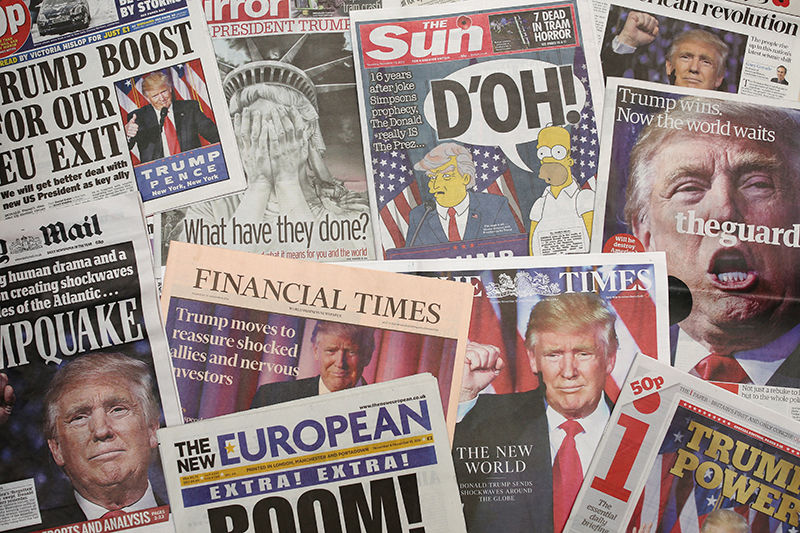Defying every last scrap of conventional political wisdom, Donald Trump stunned the world by capturing the American presidency.
Given the role the United States plays on the global stage, actors all over the world right now are scrambling to figure out what Trump’s victory means about the direction America is taking, and how best to react.
One of those actors, of course, will be the Vatican.
To use the categories made famous by Joseph Nye, the Vatican is the world’s most important “soft power,” the only major world religion which has at its core a sovereign state with its own diplomatic corps; the United States, with military expenditures exceeding all other nations combined, is the planet’s most important “hard power.”
Inevitably, therefore, the relationship between these two players is important and personnel in the Vatican’s Secretariat of State, which has primary responsibility for foreign policy, were undoubtedly trying like mad to get a read on where things stand the day after the election.
To be honest, at first blush the stars don’t seem aligned for an auspicious relationship between the current administration in Rome and the incoming one in Washington.
Never before in American history, for instance, has a President-elect been directly criticized by a sitting pontiff during the primary campaign. Back in February, of course, as Pope Francis was returning from his trip to Mexico, featuring a stop at the U.S.-Mexico border, he was asked by a reporter aboard the papal plane what he made of a politician who wanted to build a wall along that border.
“A person who thinks only about building walls, wherever they may be, and not building bridges, is not Christian,” Francis said. “This is not the Gospel.”
Granted, Francis nuanced his response by saying he was taking the reporter’s description of Trump’s position at face value. Granted, too, Trump’s initially irascible response quickly softened as he insisted the pope had been taken out of context.
Still, the new President-elect could be forgiven for not assuming Pope Francis is a natural ally.
The likely flash points between a Trump White House and a Francis Vatican are easy to anticipate: immigration, climate change, anti-poverty efforts, multilateralism in foreign policy, crime and punishment, and on and on.
The natural instinct likely will be to forecast a rocky relationship between the U.S. and the Vatican as long as Trump and Francis are the figures in charge.
On the other hand, Trump pledged in his victory speech to pursue “great relationships” with other nations, and presumably that includes the Holy See. The more interesting question, therefore, is where the current pope and the new president might be able to do business.
Aside from the reasonably obvious life issues, such as abortion, here are three other possibilities.
Anti-Christian persecution: Pope Francis repeatedly has referred to what he calls an “ecumenism of blood” playing out around the world today, and also stressed there are more Christian martyrs today than in the early era of the Church. Candidate Trump struck similar notes, at one point saying, “Overseas, ISIS has carried out one unthinkable atrocity after another … Holy sites desecrated. Christians driven from their homes and hunted for extermination. ISIS rounding-up what it calls the ‘nation of the cross’ in a campaign of genocide. We cannot let this evil continue.” The defense of vulnerable Christians, especially in the Middle East, thus could be an area of common cause.
Gender theory: Pope Francis has complained that unnamed global powers — presumably, he means secular Western governments and NGOs — are pressuring developing nations to propagate the idea that gender is flexible and socially constructed as a condition of financial assistance. He’s referred to that as part of what he describes as “ideological colonization.”
Trump hasn’t explicitly discussed the idea of gender theory, but in general, personal predilections aside, as a policy matter he professes a traditional ethical outlook, and he’s also not wild about America spending money on overseas aid. As a result, it’s reasonable to think he might be sympathetic to reviewing U.S. development programs through that lens.
Religious freedom: Candidate Trump declared, “I will make absolutely certain religious orders like The Little Sisters of Poor are not bullied by the federal government because of their religious beliefs.” As is well known, Pope Francis made a drop-in visit to the Little Sisters during his visit to the United States last September, and during his in-flight news conference on the way back to Rome declared his support for a right of conscientious objection for government officials. At least on this front, the two men would appear to be in sync.
To what extent the Vatican and the White House will be able to join forces on these or other fronts will depend, to some extent, on choices made on both sides.
For the Trump team, it will be important to choose an envoy to the Vatican perceived as a serious figure, able to move the ball, and in general to acknowledge the role the Vatican plays in global affairs. One way to accomplish that might be to tap Vice President-elect Mike Pence to take the lead, given his comfort level with religious language and belief.
For the Vatican, it will be important to send signals of openness and a desire for dialogue, and to avoid perceptions right out of the gate of girding for battle with the new American administration.
A face-value reading of the obvious contrasts between Donald Trump and Pope Francis would suggest a tense, complicated relationship. On the other hand, given that shocks to the system are now simply par for the political course all over the world, perhaps a partnership between these two figures could emerge as one of the biggest surprises of all.

